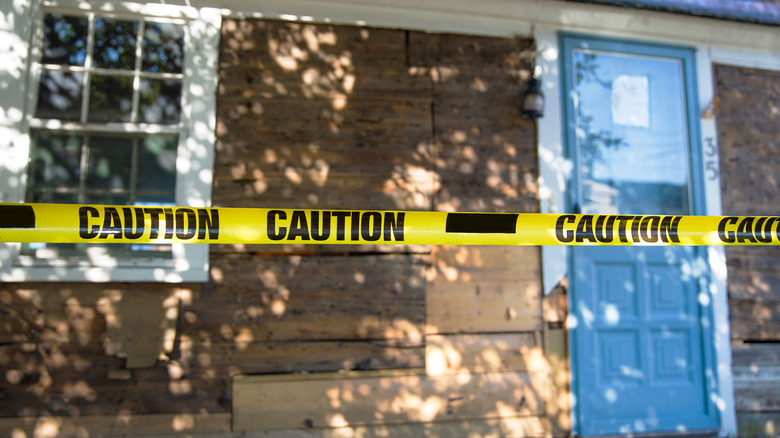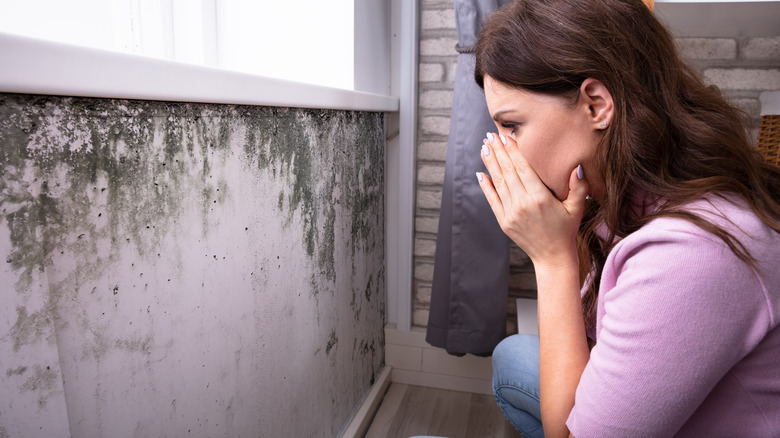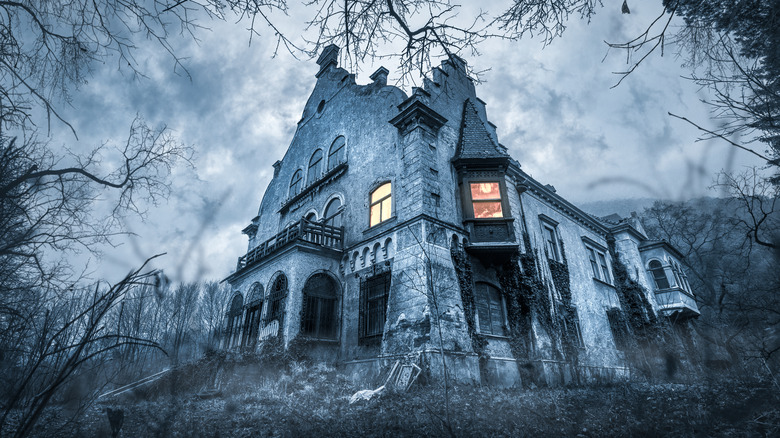Important Property Information That Real Estate Listing Sites Can't Tell You
If you're hunting for a house or rental, no doubt you started your search on the internet. The hordes running to top real estate search sites from A (Apartments.com) to Z (Zillow) are staggering, with Zillow alone drawing 36 million unique visitors a month, says Statista — and why not? These tools are relatively easy to navigate, available at all hours, and cost not a cent if you have internet. Many people use these sites to tour a home virtually, analyze costs, and compare other houses in a similar price bracket.
But how do you know if you're going a bit overboard and relying on these real estate databases for matters beyond their reach? Well, if you google a beach house in the middle of the night, fall in love on the virtual tour, and throw down money the next day, then perhaps you missed the point of an online listing. Online listings are designed to present a property in its best light: A cramped home becomes a cute cabin, an eyesore needs TLC. Still, Zillow itself also offers articles encouraging buyers to dig a little deeper. However, issues like mold and pests — bats in the belfry anyone? — are typically handled in a seller's disclosure as required in many states or through a home inspection report. The listing's goal is to draw buyers, not discourage them, after all. To that end, here are a few things you might never learn from a real estate search engine.
Someone died in the house you might purchase
It might give you head-to-toe goosebumps to think of living in a house where someone died — info unlikely to ever appear on a real estate website. If you just need to know to sleep soundly at night, there are several sources that may be able to divulge the history of your house, including your real estate agent. But this is a case where ignorance may really be bliss — especially if you ever go to resell the house. The reason? That info is something you'd have to tell potential buyers down the road, says U.S. News & World Report.
For those still curious, there's always DiedInHouse.com. Ron Condrey launched the pay-for-search site when a tenant alleged his rental was haunted and he "didn't know the history of these homes," he told U.S. News & World Report. Since deaths in a house may never be revealed in a sale, and thus never turn up on Zillow or Realtor, this website can be key to knowledge for those looking for clues to a home's hidden past.
Other ways of digging up deaths are: the library, obituaries, a Google search of the address (you might be surprised), and your real estate agent, says Family Handyman. Yes, in some states (California, Alaska, and South Dakota) sales agents must tell their buyers about deaths in a home within the last three years, and if the buyer asks, even before that.
Rodents or roaches are running rampant
Since listings are designed to attract, not scare buyers, Realtor, Trulia, and the rest of the online gang will not shed light on a pest infestation that might make a place unlivable — but mice aren't very secretive. Take a tour of the house that includes checking inside cabinets and, if you're unsure, hire a professional. Listings won't highlight termites, bedbugs, bats, or any other pest. "Knowing what you're looking for when it comes to pest droppings, casings, and wings can save you from having to take care of a pest problem later," says Glenn Bridges of Alabama's Bama Exterminating in Realtor. "Rodents nest, so check small, dark crevices of the home such as cabinets, pantries, or storage rooms for signs of them, including shredded paper or fabric." Other red flags: clusters and mud tunnels in a foundation (termites), rust-stains on bedding and furniture (bedbugs), and torn packages and dead roaches (cockroaches).
Just because the real estate website focuses on that new marble chef's kitchen and not the termites tearing up the foundation doesn't mean a seller can lie about it, though. In fact, in most states, sellers are forbidden to hide their knowledge of any infestation and could be sued for their secrecy, says Bob Vila. In fact, if sellers attempt to lie about any issues, they can be sued if an infestation is later found.
The neighbors party every weekend
Rowdy neighbors cussing and drinking beer all weekend will never get mention in a listing. Neither will Mr. and Mrs. Never Home who let their dogs bark all day and worse yet, don't clean up after them. To that end, it's best to check out the street on your own because your real estate agent is likely to be tight-lipped on the matter. Since moving into a pleasant, crime-free neighborhood is a key buyer concern, you may wonder what's the big deal? Well, some facts about a community may be in contradiction of the Fair Housing Act, which seeks to get rid of discrimination in neighborhoods, explains U.S. News & World Report. It's mean to eliminate racial, gender, religious, ethnic, and disability discrimination.
For an agent to steer homebuyers or renters away or toward a particular neighborhood based one of these federally-protected classes is a serious violation. "If the agent says that the neighborhood is a good place for kids, that could be interpreted as saying households without kids aren't welcome, which is another form of discrimination," David Reiss of Brooklyn Law School told Realtor. To say an area is not family friendly "could imply that families with kids aren't welcome," he adds.
To get a better feel for a neighborhood, a buyer might use the message board on Realtor to reach out to local residents directly. The U.S. Census Bureau website is also a good source on demographics.
A DIY homeowner did renovations without permits
DIY projects are more popular than ever, but there's a right and a wrong way to do home upgrades. The right way often requires obtaining a permit from the local building department for everything from fences to roofing, new windows to retaining walls. These permits cost money and often mean an inspection, but that doesn't mean it's a step to skip.
As a buyer, you're going to want to know of any home projects accomplished without a permit, but don't expect a red flag to come up on a real estate site. The seller is obligated to disclose the problem; failure to do so could put them on legally shaky ground, says Bob Vila. If you suspect the seller is hiding the extent of their DIY work, check with the local building department to explore the property's permit history. One sign of something amiss is if the home's configuration fails to match what's on file with the county's Register of Deeds.
The stone fireplace the homeowner built looks great, but if it violates the building code, your family's safety could be at stake. So too if electrical upgrades, furnace repairs, and plumbing have been tackled by someone other than a licensed professional. Such DIY work could mean trouble when you go to resell without any record of those permits; the next buyer could be more strict about legalities than you were.
The house wore crime scene tape after a gang shootout
St. Valentine's Day had a whole different meaning in Chicago back in the days of Al Capone and the infamous mob shootings. That's when 2122 N. Clark Street went down in history for the St. Valentine's Day Massacre, according to Smithsonian Magazine. The year was 1929, yet that business address has not lost its notoriety.
Similarly, if your prospective home was all over the news and is now stigmatized, you'd want to know about it. Such a property is one that people see in a negative light perhaps because of criminal activity. Regardless of the home's condition, a stigmatized property can cause people to avoid purchasing it, as noted by Bankrate. This often makes it difficult to get full price for a house. However, hiding the truth about a home's unsavory past could have legal consequences to the tune of a lawsuit, explains Bob Vila.
It is a requirement in some states that sellers disclose any stigmatizing events attached to their home. Was it ever used as a meth lab, house of gambling or sex work, or a gang hideout? Did crime scene tape block the front door after a murder, suicide, or kidnapping? But again, the online listing is not the place for this revelation; Zillow, Trulia, and the rest may not even know your home's past.
If you or anyone you know is having suicidal thoughts, please call the National Suicide Prevention Lifeline at 1-800-273-TALK (8255).
The entire neighborhood is a target for crime
The most beautiful home in the world will lose its luster if you're forced to dodge bullets outside the door. However, real estate websites won't say much about muggings, carjackings and other crime in a neighborhood you might be contemplating. This may go back to the federal anti-discrimination laws mentioned earlier. Real estate agents typically won't discuss crime because of these laws, which protect different classes of people against bias. It may be difficult to address crime rates without tarnishing a neighborhood or a protected class. And sales agents can never use such information to steer people toward or away from a neighborhood — that's a major taboo.
For buyers who still want to know if they're moving their family into Gang Central or a drug hot spot, there are other ways to connect the dots. Zillow suggests online research, which can help you figure out what goes on in an area as well as its history. Other options include driving through the neighborhood at all hours, talking to people who live there, and referring to crime-data sites. Some of the best are City Data, AreaVibes or CommunityCrimeMap, according to Realtor. For those concerned about children's safety, Realtor also suggests a quick search on the National Sex Offender Public Website.
Mums the word on alligators, pythons, and black bears
It might be rare, but there have been reports of alligator attacks and other wildlife threats from rabid raccoons to pythons. While a real estate listing won't introduce the black bear that routinely raids the garbage, a Google search will reveal the types of wildlife that call the area their home.
Buying a home near rivers or marshland inhabited by alligators could make a parent think twice. Over the last 10 years, the State of Florida has averaged seven unprovoked bites each year severe enough to warrant medical care, says Fox News. Additionally, more than two million wild alligators live in Louisiana, where a 12-footer is believed to have killed a man around the time of Hurricane Ida. Alligators also make their home in Oklahoma, Texas, and North Carolina, a fact prospective home buyers may want to know. Other potential deadly threats, according to Owlcation, are cougars, coyotes and wolves, spiders, scorpions, bees and fire ants, bears, wild boars, snakes, and marine life like sharks and stingrays. The list grows when we think about how rabies transforms more docile creatures, like raccoons and bats, into dangers.
Since attacks on humans are unusual, the presence of any of the creatures on this list should not scare you from a dream house. But it's always wise to enter a neighborhood with eyes open your eyes to possible hazards — and this is a bit of research the real estate sites leave to you.
Natural disasters and flooding could threaten your home
Your best plans for a new home may be shattered if flooding is as customary as the spring rains. Flood waters can ruin just about everything invested in a house and create mold. Yes, flooding is bad news, and buyers want a heads-up if a listing is prone to this potential homewrecker. Even it's only ground water in the basement, it's better to find out before signing a contract than get stuck mopping after each storm.
Just as devastating can be earthquakes, mudslides, wildfires, volcanoes (Remember Mount St. Helens?), and sinkholes. No buyer wants to be kept in the dark on any of these potential threats. Fortunately, states mandate that sellers reveal this knowledge to buyers, and may even require they fill out a form indicating as such, per House Logic.
Because it is a serious issue, websites provides tools to assess flooding on some listings, and one option is the Federal Emergency Management Agency (FEMA) website, which keeps flood maps. Sales agents often can find out if a home requires flood insurance or is in a flood plain, and a home inspector can pinpoint water damage. As for the other natural disasters that might befall a home, owners are encouraged to be upfront to avoid dire legal and fiscal consequences.
The home's last owner smoked three packs a day
With allergies and air quality concerns, many people want to know if a home has a smoking history. Smoking does more than harm a person's lungs; it can stain (or yellow) walls, rugs, and furniture. And that ashtray odor can linger long after the smoker has moved, standing out as a major nuisance to the buyer. Beyond nicotine, vaping and marijuana smoke can also create odors and allergy issues, which non-smokers may find offensive and even unhealthy.
Don't expect a real estate website, with limited space for listings, to deviate from the basics and dig into a home's smoking history. But if corrective action is not taken, lingering smells can reduce a home's resale value, so it's okay to say something. "If a home has been smoked in and you don't remediate the problem, you are likely to have less competition from buyers," says Alabama-based sales agent Jessica Smith in HomeLight. "I've had buyers who loved a home but decided against purchasing it because the cigarette odor was so strong."
Will the house evoke feng shui peace and harmony?
According to National Geographic, feng shui is the old Chinese practice of laying out furnishings and more in your interior space to manifest the utmost peace and harmony in a home. An increased number of western cultures are gradually embracing feng shui for homes with a peaceful presence — an exercise that goes far beyond furniture placement to choosing the right home, based on typography and orientation.
What direction does the front door face? That's not something a real estate site will advertise, but a south-facing door is essential for feng shui. According to Virginia-based Joy Design & Build, you also don't want to live in a home that is on a ridge or cliff, adjacent to busy roads and intersections, or right by a river for optimal feng shui. Other features that bring bad feng shui to your home are sloping land behind the house, the main door located on the side, and a big tree blocking sunshine in front of the home.
Learning such details about a home's environment inside and out cannot be left to a listing, but typically demand a tour of the property. So, check off another item you'll have to investigate before getting serious about a home if you too have an interest in feng shui.
Mold and water issues lurk right under that brand-new rug
A seller may tip you off to a mold issue, but a home inspection is a more dependable source of that potentially deal-breaking news ... or perhaps your own sense of smell. Some telltale signs are a musty smell or strong air fresheners — a great mask for mildew.
There are different types of mold, including some that can be easily eliminated, but "if it's hazardous and it's toxic, it tends just to destroy the deal," Iowa sales agent Matt Mauro told HomeLight. Keep in mind that it doesn't have to be toxic black mold to cause respiratory problems, a rash, headaches, and other health woes. If a home has a mold history this fact, and whether an expert treated the problem, must be disclosed by the seller in most states.
Beyond health risks, mold may tip off buyers to a problem with the house, such as an ongoing leak beneath sinks, in a crawlspace, or in the basement. If there's mold, rugs, wood, drywall, and other construction material may have to go, according to Bob Vila.
The house is haunted, and that's why it's such a steal
Perhaps you've grown up with stories about an eerie old house that no one dares spend the night at. Naturally, you don't want to be the out-of-towner who stumbles on an outrageous deal, hears a blood-curdling scream, and then also doesn't want to spend a night there. A death in the house doesn't necessarily mean it's the next Amityville Horror, but reports of paranormal activity may be worth checking out ... before your home deal is a nightmare.
There's a chance a house stigmatized as "haunted" will be disclosed by the sellers, but not every state makes it a requirement. "In many states, it's not mandatory to disclose a stigma like a murder, suicide, or crime — or paranormal activity," says Massachusetts agent Dana Bull to Realtor. "You can check with a real estate attorney in your state for the rules."
Often, a buyer is left to their own devices, which may include talking to neighbors, Googling the property address — these legends tend to spread — and visiting a website like DiedInHouse.com. We'd venture to say that Zillow, Trulia, and the other digital house-hunters will not identify a house as haunted in a listing. That could be damaging to the seller and flies in the face of a listing's purpose.
If you or anyone you know is having suicidal thoughts, please call the National Suicide Prevention Lifeline at 1-800-273-TALK (8255).
The last owner had multiple pets and left the smell behind
This is a job for our nose and not a real estate website. Some pet smells can linger on carpets and wood floors and take substantial effort to get rid of. For those with allergies, exposure to cats and dogs as well as the dander they leave behind can trigger asthma and other health issues. "Cat allergen in particular can stay around for a long while," says Dr. Jay Portnoy, a pediatric allergist at Children's Mercy in Kansas City, to Allergic Living. "It doesn't spontaneously decay very quickly. It can take up to six months to drop by half its potency."
Dog dander also may flare up allergies so be wary when shopping for a home or apartment. In many cases, the nose knows and the person with allergies will have to visit to sniff and see if symptoms flare up. Home seeker Michaela Smith shared with Allergic Living her experience searching for a home in Denver free of pet and other irritants. "I thought it would be really easy to find a place, but I probably contacted more than a hundred places," she reveals. Not only the nose, but the eyes, which got "really, really itchy," told Smith whether the home should be a go.
Some photos may be distorted or digitally enhanced
True, a seller wants to paint their home in the best light with photographs that don't distract from its image. But often photos are missing or fail to tell the whole story. Some folks will even distort photos, making the home look better than reality. Even if their purpose is not to be deceiving, bad photos can mislead a buyer and waste time that could be spent on other listings. "Lighting is tough to trust in photos," says Chad Dierickx, a Seattle area broker on his website. He explains that most real estate photographers employ high dynamic range (HDR) techniques — this uses software to blend together identical shots of a room into one bright, high-def photo. The homes may sparkle, but Dierickx says, "just keep in mind that it's difficult to know how bright a home really is before you step inside."
Another Washington real estate professional, Dan McCurley, warns of a widespread Photoshop trend on his website: stretching photos to make a room appear bigger. To avoid getting fooled, McCurley recommends examining appliances and doors to "be on the lookout for inaccurate sizes, shapes, and proportions." Yet another way a photo can hide facts is the property's dimensions? A well-framed photo may conceal that a listing is very close to its neighbors, says Dierickx.














